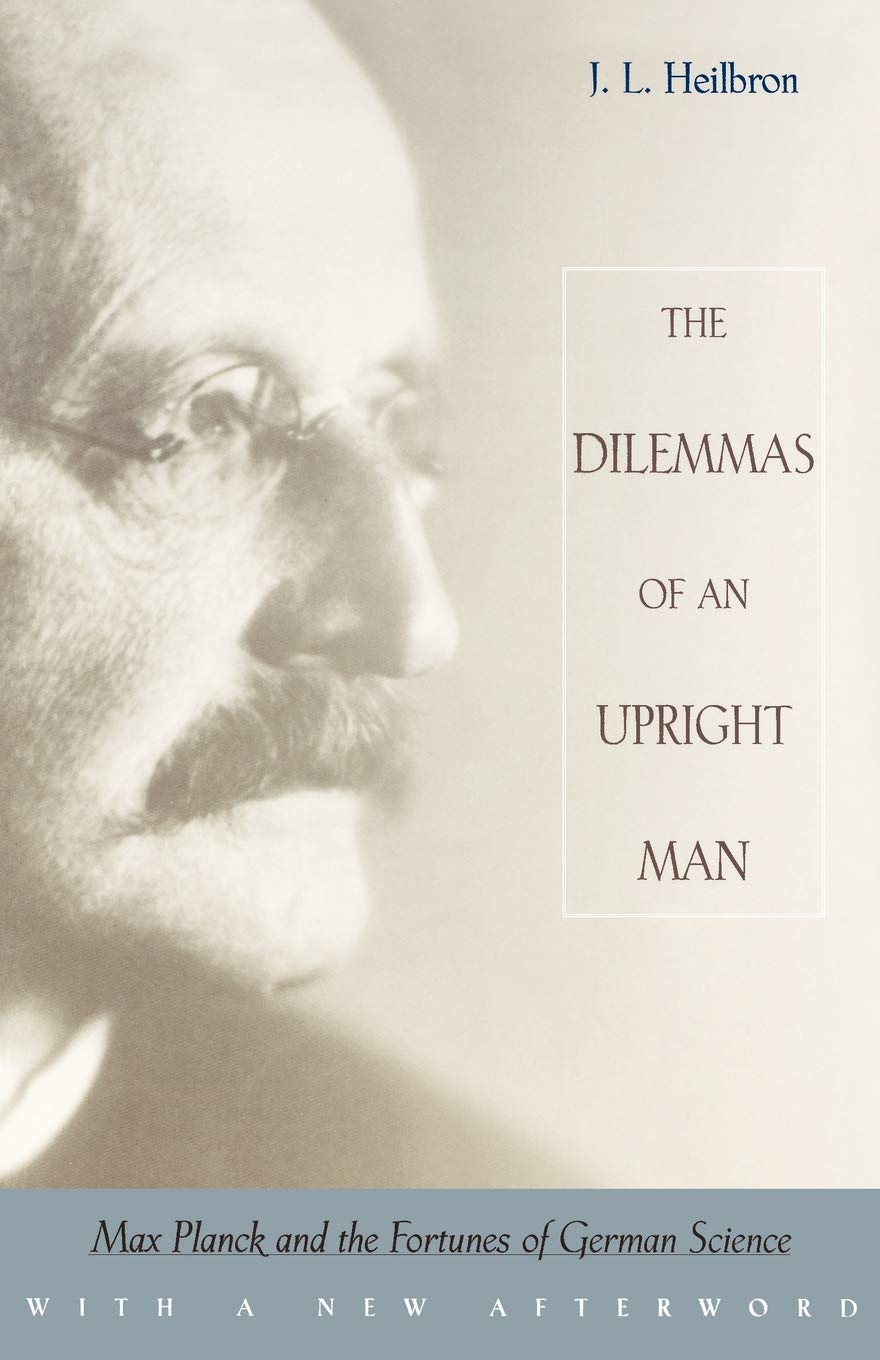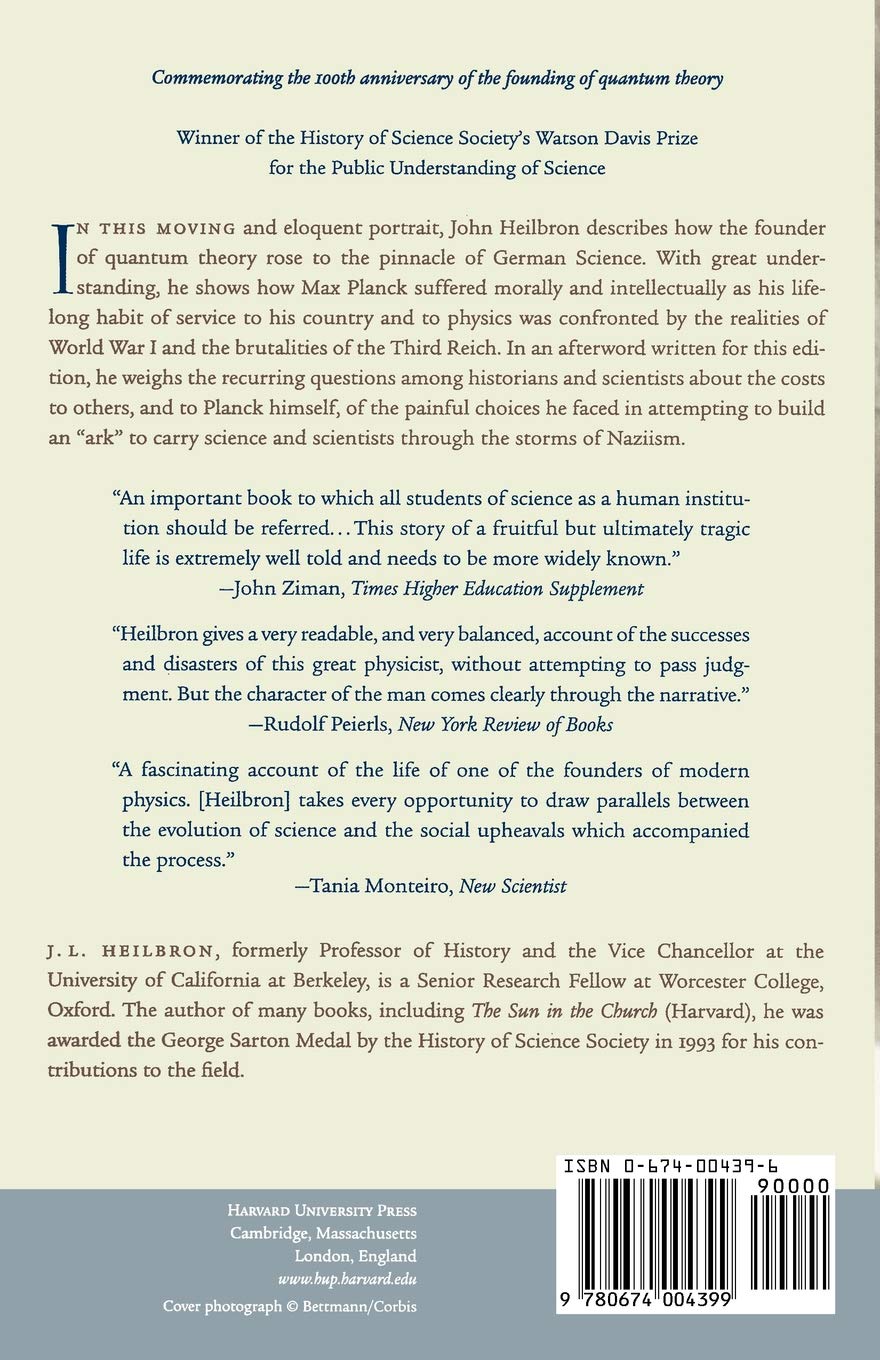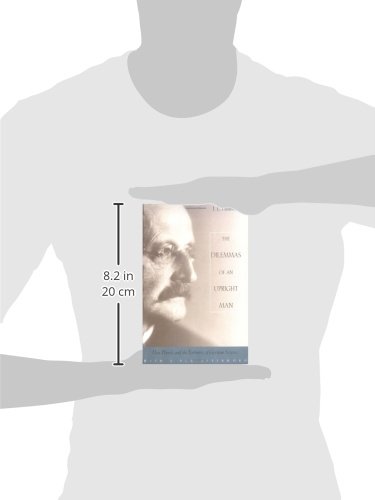



Full description not available
V**O
His long life and the loss of 2 girls and 2 boys.
a comprehensive survey over the long (and, finally, useless) life of Max Planck. Lost 2 daughters and 2 sons(the latter in January 1945, sent to die by people in the surrounding of Hitler). Died in 1947 after havinggiven his name to a new edition (MPIs) of what had been the series of Kaiser Wilhelm Institutes
A**D
Very interesting
Very interesting
D**N
Scientific genius in a world of political turmoil
This book on Max Planck is not strictly a biography. It covers Planck’s life but does so with the purpose of showing the struggles of German science during Planck’s lifetime. The book shows an eye-opening and often frightening part of scientific history. Planck is often considered the father of quantum physics; it was his discovery in 1900 of what we now call the Planck Constant that laid the groundwork for what is now a major way of understanding atomic and subatomic action. J.L. Heilbron does a fine job of explaining Planck’s scientific work, including the discovery of the quantum and Planck’s own understanding of what he had achieved. Heilbron uses only the most essential equations and almost all the explanations are in clear and well-written English. This was not intended to be an exhaustive book on Planck’s work in physics; nevertheless, the book defines and explains Planck’s achievement and how that affected the future of science in a way that non-scientists interested in physics can understand.What really drives this book are the questions surrounding Planck’s character and the events in Germany from 1900-1947. In this regard the book is superb. Planck achieved high-level recognition for his work prior to 1914 and was rewarded throughout his life with dominant positions in German scientific institutions. He then had to deal with how to handle World War I and the rise of the Nazis. Heilbron lays out in detail how, for example, Planck signed the “Appeal of the Ninety-three Intellectuals” in 1914, a deliberate government-sponsored propaganda document which expressed the solidarity of German scientists with the German army and repudiated as false any accusations of atrocities by the German Army. (Einstein refused to sign.) Planck spent a great deal of time later in life repudiating his part in signing that document. Heilbron does an excellent job of contrasting Planck, who was what we would call moderate right wing, with the extreme right wingers of Stark and Wien and the clear differences from Einstein. When the Nazis came to power, Planck continued in a position of dominance in German scientific circles and he “accommodated” himself to the situation. Nevertheless, as Heilbron shows, when he had a chance, he would always put in a subtle criticism of the regime in his speeches or writing but he could never mention the traitor’s name, Einstein. What he never did do was any public action to repudiate the brutally unjust firing or expulsion of non-Aryans in science. He argued that he could be more effective inside the institutions of science than as an outsider. By the time of the Nazis Planck was in his late 60’s and early 70’s and his power was increasingly titular with the real power eventually taken over by those who detested “Jewish” theoretical physics like relativity. What should Plank have done? This book is terrific at keeping that question in the forefront and showing the interrelation of politics and science in Germany. The differences between Einstein, Planck, Heisenberg and the Nazis are all brought into play. Planck’s number one goal in his career was to maintain the integrity of science per se. But it becomes hard to tell when he is doing that and when that is a front for other motives.This is a scary book and it SHOULD be. The life of this scientific genius brings into focus questions that haunt far more people than great scientists. How does one respond to evil given one’s situation in life? Heilbron’s book explains to the reader Planck’s scientific breakthroughs and at the same time raises issues that go far beyond science. Heilbron tends to come down on Planck’s side (the “upright man” in the title) but do not let the title fool you. The author has no qualms about raising issues that from this point in time look like mistakes or cowardice on Planck’s part. But this is now; how would we respond in Planck’s situation at that time? Issues of courage, scientific integrity, national pride in a deep and rich culture – these are questions that this book raises clearly. I highly recommend this disturbing and thought-provoking book.
S**
An excellent book on a complex subject
Max Planck, with the discovery of Planck's Constant, laid the foundation for Quantum Physics and didn't even realize the broader implications of his discovery at the time. For years, he and his good friend Einstein resisted accepting quantum theory, for they still thought a better explanation would come along, a unified theory which would embrace Newtonian physics while also explaining odd quantum phenomena turning up in the laboratory. When Planck, at first a staunch Newtonian physicist, realized that quantum mechanics, with its statistical analyses and entanglement and uncertainty wasn't going away, he embraced it, and at once became the target of the classical physicists he had left behind. This book skillfully paints a picture of this unfolding drama, including the horrific tragedy of how, in the end, the Nazi movement and WWII doomed the respectability of Planck's beloved German physics research organizations. Planck was also a philosopher of science, writing and lecturing widely on the ethics and philosophy of physics, and the book also describes how Planck's philosophy unfolded over his lifetime. Explains enough quantum mechanics at the lay level to give you the concepts you need to know to understand the history being laid out, without complicating it with the higher mathematics which a lay person would find difficult to follow. An excellent read, well written, and meticulously researched. Definitely recommended.
S**T
Good Reading Book for Young and Old
I purchased this for my grandson who needed to read a book for a high school project related to science and quantum theory. He enjoyed it for the scientific perspective it presented. I was interested particularly in reading about Planck's life in Germany during the war and how he tried to deal with Hitler's regime -- and live. "Dilemna" is an understatement here. Yes, some of the material was superfluous and could be scanned over. However, I did not agree at all with the reviewer who deemed the book to be dry.
M**E
His life as a education tsar
It is not a biography but rather as the title says, his dilemmas in life and decisions he had to make during his life. I wonder how he found the time to be everywhere for everybody. It starts quickly with quanta idea and that goes into the administrative acts, institutions, academies he established and became a director. His dilemmas during the Nazi regime and his hopes that eventually people will come to right way and considerations that these are transitional times. Meanwhile it looks like he was willing to separate people into groups valuable and worthless, interesting, no wonder Einstein never forgave him. I did not find the book fluent. It was jumping all over with a lot of institution names and dates and persons, sort of broken in pieces.
Trustpilot
5 days ago
1 week ago